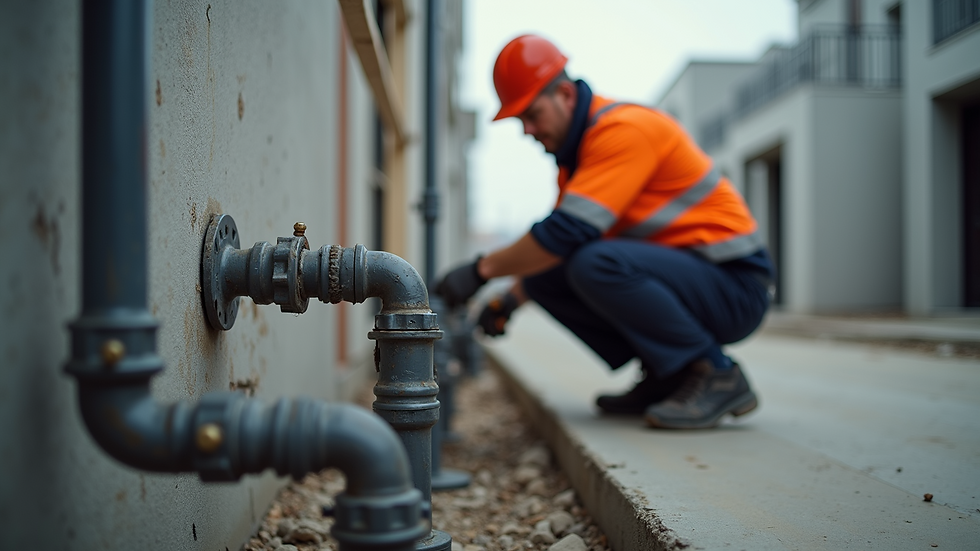Top Renovation Plumbing Tips for Homeowners
- mikeholledge
- Aug 17, 2025
- 4 min read
Renovating your home can be an exciting journey. It’s a chance to create a space that reflects your style and meets your needs. However, when it comes to plumbing, things can get tricky. Plumbing issues can arise unexpectedly, leading to delays and added costs. To help you navigate this process smoothly, we’ve compiled some essential plumbing tips for homeowners embarking on a renovation project.
Understand Your Plumbing System
Before you start any renovation, it’s crucial to understand your existing plumbing system.
Know the Layout: Familiarize yourself with the layout of your pipes, fixtures, and appliances. This knowledge will help you plan your renovation effectively.
Identify Key Components: Locate your main water shut-off valve, as well as any individual shut-off valves for sinks, toilets, and appliances. Knowing where these are can save you time and trouble in case of an emergency.
Check for Issues: Inspect your current plumbing for any leaks, corrosion, or signs of wear. Addressing these issues before starting your renovation can prevent bigger problems down the line.
Plan Your Renovation Wisely
Planning is key to a successful renovation.
Set a Budget: Determine how much you are willing to spend on plumbing. Include costs for materials, labor, and unexpected expenses.
Hire Professionals: While DIY projects can be fun, plumbing is often best left to the experts. Hiring a licensed plumber can save you time and ensure the work is done correctly.
Get Permits: Check with your local building department to see if you need permits for your plumbing work. This step is essential to avoid fines and ensure your renovation meets local codes.
Choose the Right Materials
Selecting the right materials can make a significant difference in the longevity and efficiency of your plumbing system.
Pipes: Consider using PEX (cross-linked polyethylene) pipes. They are flexible, resistant to scale and chlorine, and can be easier to install than traditional copper or PVC pipes.
Fittings and Fixtures: Invest in high-quality fixtures and fittings. They may cost more upfront, but they can save you money in repairs and replacements in the long run.
Water Heaters: If you are replacing your water heater, consider energy-efficient models. Tankless water heaters, for example, provide hot water on demand and can reduce energy costs.
Be Mindful of Water Pressure
Water pressure is an important factor in any plumbing system.
Check Your Pressure: Use a pressure gauge to check your water pressure. Ideally, it should be between 40 and 60 psi. If it’s too high, it can cause leaks and damage to your pipes.
Install Pressure Regulators: If your water pressure is consistently high, consider installing a pressure regulator. This device can help maintain a safe pressure level throughout your home.
Plan for Drainage
Proper drainage is essential for any renovation project.
Slope Your Drains: Ensure that your drains are sloped correctly to allow for proper water flow. A slope of 1/4 inch per foot is generally recommended.
Use Cleanouts: Install cleanouts in your plumbing system to make it easier to clear clogs. These access points allow plumbers to clean out the pipes without extensive digging.
Consider a Sump Pump: If you are renovating a basement or lower level, consider installing a sump pump. This device can help prevent flooding and water damage.
Don’t Forget About Ventilation
Ventilation is often overlooked but is crucial for a healthy plumbing system.
Install Vents: Proper venting allows air to enter the plumbing system, which helps wastewater flow smoothly. Make sure your renovation includes adequate venting for all fixtures.
Check for Blockages: Inspect existing vents for blockages. Leaves, debris, or even bird nests can obstruct airflow, leading to plumbing issues.
Test Your System
Once your renovation is complete, it’s time to test your plumbing system.
Check for Leaks: Turn on all faucets and fixtures to check for leaks. Pay attention to joints and connections, as these are common areas for leaks to occur.
Test Water Pressure: Use a pressure gauge again to ensure your water pressure is within the ideal range.
Run a Drainage Test: Fill sinks and tubs with water and then drain them to ensure everything is flowing properly.
Maintain Your Plumbing
After your renovation, regular maintenance is key to keeping your plumbing in good shape.
Schedule Inspections: Have a professional plumber inspect your system regularly. They can catch potential issues before they become major problems.
Know Your System: Keep a record of your plumbing system, including any repairs or upgrades. This information can be helpful for future renovations or repairs.
Educate Your Family: Teach your family members about the plumbing system. Make sure they know how to turn off the water supply in case of an emergency.
Final Thoughts
Renovating your home can be a rewarding experience, especially when you take the time to plan and prepare for plumbing needs. By understanding your plumbing system, choosing the right materials, and maintaining your system, you can ensure a successful renovation.
Remember, a little knowledge goes a long way. With these tips, you can tackle your renovation with confidence and create a space that you and your family will enjoy for years to come.



Comments